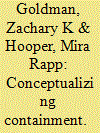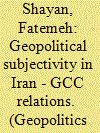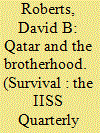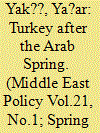|
|
|
Sort Order |
|
|
|
Items / Page
|
|
|
|
|
|
|
| Srl | Item |
| 1 |
ID:
126692


|
|
|
|
|
| Publication |
2013.
|
| Summary/Abstract |
Zachary K. Goldman and Mira Rapp-Hooper discuss American security interests in the Persian Gulf region and the prospects for effective cooperation among Gulf States to contain Iran. They ?nd that it is unlikely that the United States will be able to establish a containment regime that relies upon the Gulf Cooperation Council and that informal, bilateral ties to states in the region are a preferable policy recourse.
|
|
|
|
|
|
|
|
|
|
|
|
|
|
|
|
| 2 |
ID:
123715


|
|
|
|
|
| Publication |
2013.
|
| Summary/Abstract |
This article enters into the debate about geopolitical subjectivity between Iran and the members of the Gulf Cooperation Council (GCC) on the three islands issue. The islands at the Western entrance to the Strait of Hormuz have so far been examined as an issue between Iran and the United Arab Emirates from historical, sovereignty and law perspectives, but this article examines the argument that the GCC has become a geopolitical subject through its support for the US policy of isolating Iran. Geopolitical subjectivity, a concept building on Pami Aalto's conceptual scheme, is the concept of goal-oriented ordering of territories and political space. We can use it to identify the GCC institution as a subject with the ability to act (and abstain from acting) and to examine Iran's response to the GCC's willingness to order the three islands. The conclusion is that the GCC became a subject in this context as soon as it felt the benefits of US support and the current rise of the soft power of Qatar. Even so, it has been unable to undermine Iran's sovereignty rights over the three islands, and the issue has strengthened, even exaggerated, states' adherence to the concept of sovereignty throughout the Persian Gulf region.
|
|
|
|
|
|
|
|
|
|
|
|
|
|
|
|
| 3 |
ID:
128844


|
|
|
|
|
| Publication |
2014.
|
| Summary/Abstract |
Tehran's military capabilities do not match its ambitions for recognition and status. It is cautious, defensive and prudent in resorting to force, due as much to experience as to realism about its own limits. Iran has been a source of international concern for decades. Its general hostility to the international system disturbs the regional order. Tehran's initial aim of exporting the 1979 revolution, supplanted later by exporting its revolutionary model, has caused anxiety in smaller, traditional regimes. And the view that it is a belligerent state all too ready to resort to force feeds concern about its nuclear ambitions. This perspective, largely shared by Israel and some members of the Gulf Cooperation Council, is plausible but incomplete. I will argue that by orthodox standards Iran is militarily weak, and cautious, defensive and prudent in resorting to force. This is due as much to experience as to realism about its own limits. The country does not see itself as a military power or aspire to become one, even if some of its utterances and behaviour leave room for scepticism on this point.
|
|
|
|
|
|
|
|
|
|
|
|
|
|
|
|
| 4 |
ID:
132464


|
|
|
|
|
| Publication |
2014.
|
| Summary/Abstract |
In June this year, an Egyptian court's decision to sentence three Al-Jazeera journalists to lengthy prison terms marked a new low in deteriorating Qatar-Egypt relations, but was only one among many international-relations difficulties that the small Gulf state has faced in recent years. The tenure of Emir Tamim bin Hamad Al Thani, who ascended to the throne in summer 2013, has been something of an annus horribilis for Qatar, even in terms of the country's relations with its fellow Gulf Cooperation Council (GCC) states, with which it has much in common. Against a backdrop of sporadic intra-regional problems, the latest iteration of these difficulties crystallised in early March, when Saudi Arabia, the UAE and Bahrain took the unprecedented step of withdrawing their ambassadors from Qatar en masse.
|
|
|
|
|
|
|
|
|
|
|
|
|
|
|
|
| 5 |
ID:
130937


|
|
|
|
|
| Publication |
2014.
|
| Summary/Abstract |
Turkey's attitude regarding developments in the countries affected by the "Arab Spring" varied according to the approach of the ruling Justice and Development Party (Adalet ve Kalk?nma Partisi, AKP) and its perceptions of the countries in question.
In Tunisia, Annahda, a political party that originated from the Muslim Brotherhood (MB) tradition, emerged as the strongest political movement after the fall of the Ben Ali regime. Annahda has an ideological affinity with the AKP, which also has Islamist roots. There is, in addition, a deep-rooted tradition in Tunisia to regard Turkey as a source of inspiration for various reforms. Turkey was, at the beginning of the Arab Spring, referred to by some as a role model. This concept did not acquire much content as time went by, however.
In Libya, Turkey hesitated at the beginning to get involved in the crisis and even wanted to keep NATO out of it.1 Seeing, however, that "a coalition of the willing" was going to intervene with or without Turkey, it made a swift change and participated in the operations with six aircraft and five ships.
When the mainly Shia population of Bahrain wanted to follow the example of the other Arab Spring countries and protest against its Sunni ruler, Saudi Arabia formed a Gulf Cooperation Council (GCC) intervention force, composed mainly of Saudis, and repressed the demonstrations with a ruthlessness comparable to the methods used by the ousted regimes in the other Arab countries. The international community adopted a double standard and kept silent; Turkey went along with this consensus.
Turkey's reaction to the events in Yemen was restrained; it was viewed as a distant country and of low priority on the international agenda. The fact that Saudi Arabia stepped in as the main actor may also have played a role in Turkey's lack of enthusiasm for getting involved more deeply.
|
|
|
|
|
|
|
|
|
|
|
|
|
|
|
|
|
|
|
|
|